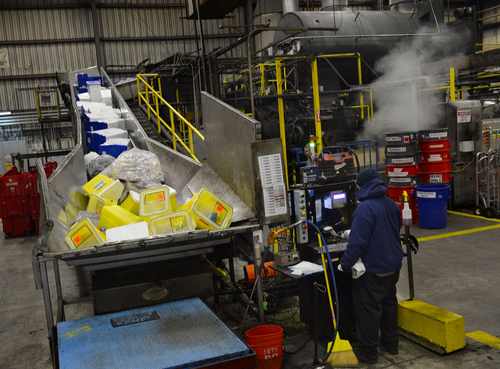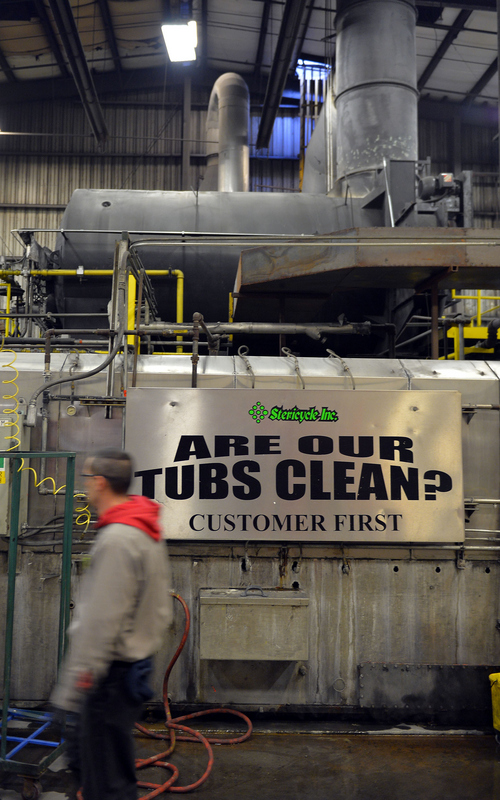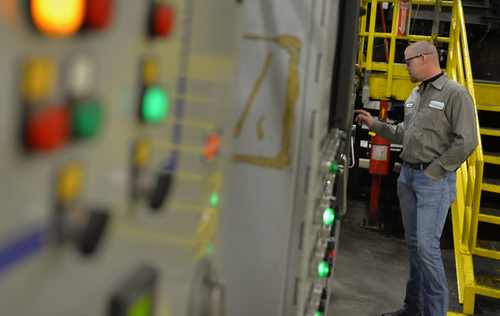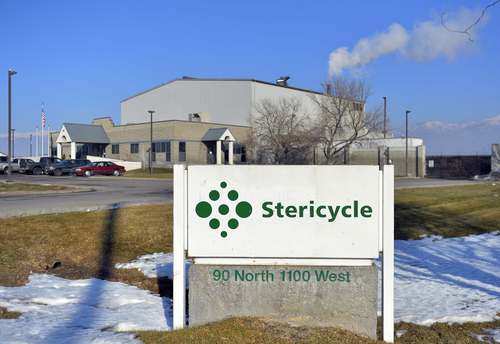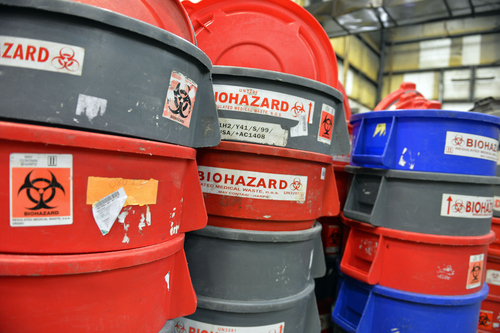This is an archived article that was published on sltrib.com in 2014, and information in the article may be outdated. It is provided only for personal research purposes and may not be reprinted.
Medical waste handler Stericycle wants to move its controversial incinerator out of a North Salt Lake neighborhood and it has secured remote state land in western Tooele County for that purpose, company officials said Friday.
In recent years the plant has become surrounded by the Foxboro subdivision and a target of clean air activists and state environmental regulators. Such a move would diffuse some of the conflict, although the company's increasingly vocal critics want Stericycle to stop incinerating, regardless of location.
"While we are still legally and compliantly operating at our current location, we believe this will be a better option for the future of our operations in Utah," said Selin Hoboy, the Illinois-based company's vice president of legislative affairs.
"There are still many issues that need to be worked out including legislative approval and state permitting etc.," she said in an email, "and it will take a considerable amount of time to get through all of that and timing will be dictated by the process."
State law also requires the governor's sign off on any new solid waste disposal site. Gov. Gary Herbert's staff has facilitated the land acquisition needed for the move.
Years of generally peaceful co-existence between the incinerator and its neighbors came to a sudden end last May when the state Division of Air Quality issued a notice of violation against Stericycle. It alleged the company exceeded the emission limits set in its permit, failed to report releases that exceeded them, and rigged a test of its stack.
The company contests the allegations, which nonetheless prompted a tsunami of community activism against Stericycle, which operates six incinerators as regional hubs around the country. The Utah plant handles medical waste, mostly pharmaceuticals and IV bags and tubing containing trace amounts of chemotherapy agents, from several Western states, according to Stericycle executives.
The Utah School and Institutional Trust Lands Administration, or SITLA, has agreed to sell Stericycle land west of the Stansbury Mountains, according to Hoboy.
"It's a remote part of Tooele County. We think it will be a good home for us," said Hoboy.
She did not identify the exact location, but it is likely near Interstate 80 where other industrial waste facilities, such as EnergySolutions and Clean Harbors, already operate in the sparsely populated West Desert.
Still, Stericycle executives deny the existing plant poses any health risk to Wasatch Front residents or contributes much to the region's notorious episodes of heavy particulate pollution.
The company's critics, however, contend no medical waste should be burned and the proposed upwind move would not satisfy them.
"While that sounds like a resolution, we are not dealing with it as such," said Brian Moench, president of Utah Physicians for a Healthy Environment. "No one is interested in putting that facility in someone else's community."
Meanwhile, two Republican lawmakers, whose Davis County districts include Foxboro, are drafting legislation that would ban medical waste incineration within two miles of schools and residential subdivisions.
Homes now line the Stericycle property on its north and east sides and at least five schools are within several blocks of the plant, including Foxboro Elementary, two charter schools and two Spectrum academies serving autistic students.
A big question surrounding the proposed ban is whether it can be retroactively applied to an existing incinerator, especially one that was sited in an industrial area that residential developers approached later.
"We are looking at all our options," said co-sponsor Sen. Todd Weiler, R-Woods Cross. "There is a vested rights issue. It was properly permitted when it was built."
He endorses the move although he realizes it won't mollify activists who want to put an end to incineration in Utah.
"The reality is, it's not going to happen. There are too many benefits of it and too much of a need for it," Weiler said. "They are asking for us to ship our waste out of state and I don't think that's good public policy."
Tooele County leaders say they support Stericycle moving in, but they want assurances that the incinerator will be appropriately sited and operated properly before they fully embrace the proposal.
"We've only had some general conversations at the 30,000-foot level. The details have yet to be worked out," said Tooele County Commissioner Shawn Milne. "We want to make sure there is no veracity to the allegations that they are a major polluter."
It's imperative that the plant not be located in a place that could someday see homes and schools crop up, Milne said. The conflict in North Salt Lake arose from poor planning that allowed an industrial area to get rezoned for residential uses, Milne said.
"Tooele County is bigger than three states and we only have 60,000 people. That's a whole lot of open space where they will likely get away from future residential growth," he said.
Air-quality town hall Wednesday
The Tribune's Jennifer Napier-Pearce will moderate a town-hall discussion on Utah's air quality challenges with a panel of experts at 7 p.m. on Wednesday, Jan. 29, at the Salt Lake City Main Library, 210 E. 400 South.
The discussion will be broadcast live on KCPW 88.3/105.3 FM and at sltrib.com. You can submit questions in advance by sending an email to utairquality@sltrib.com. —
Share the story of your bad air day
How does poor air quality affect you? The Salt Lake Tribune and KUED Channel 7 want to hear your bad-air-day stories — whether written or video-recorded.
Send stories to utairquality@sltrib.com with "My Bad Air Day" in the subject line, or share them at facebook.com/saltlaketribune.
Share video stories on Tout at tout.com/sltrib or at #mybadairday on Instagram. The Tribune and KUED will share your stories as part of our ongoing air-quality coverage.


